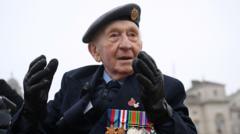
Remembrance Day: A Poignant Tribute to Sacrifice and Memory
At this year’s Remembrance service in London’s Whitehall, six surviving D-Day veterans marched past the Cenotaph, a stark reminder of the dwindling generation of World War II heroes. Among them was 101-year-old Joe Randall, who at 20 had helped build temporary airfields during the invasion that liberated Europe from Nazism.
The veterans, with a collective age of 595 years, were outnumbered by eight former prime ministers, symbolizing the passage of time and the fading of living memory. One veteran’s determination was particularly moving – the last marcher left his wheelchair and used a walking frame to walk upright past the Cenotaph, a stubborn defiance against aging.
The ceremony was marked by powerful moments of remembrance. Big Ben tolled, and a two-minute silence fell over Whitehall. Even in our digital age, people momentarily put down their mobile phones, creating a sense of collective reflection.
King Charles, battling cancer, led the proceedings, embodying a spirit of public service and endurance. The Princess of Wales watched from the Foreign Office balcony, herself recovering from health challenges. Political leaders Sir Keir Starmer and Kemi Badenoch participated for the first time as prime minister and opposition leader, likely contemplating current global conflicts.
A particularly emotional segment featured children from Scotty’s Little Soldiers charity – young people who had lost parents in military service, representing the ongoing human cost of conflict.
The Cenotaph itself emerged as a powerful symbol. Originally a temporary wooden structure, it now stands as a permanent Portland stone monument. Its deliberate plainness – lacking ornate religious imagery – allows it to represent a diverse, multi-faith world, with representatives from over 20 different beliefs gathered around it.
The memorial serves as more than just a monument; it becomes an altar and national shrine, transforming Whitehall into a space of remembrance. As the article notes, the Cenotaph is intentionally positioned to “get in the way” – an uncomfortable reminder designed to prevent people from forgetting the sacrifices of previous generations.
Behind the proceedings, a Ukrainian flag hung limply over the Foreign Office, subtly connecting historical remembrance with contemporary global tensions.
The day captured the essence of remembrance: honoring past sacrifices while acknowledging the continuing impact of conflict. From aging veterans to young children who’ve lost parents, the ceremony bridged generations, ensuring that the memories of those who served are not forgotten.
In a world of constant change, the Remembrance Day service stands as a powerful, timeless tribute to human courage, sacrifice, and the enduring hope for peace.









